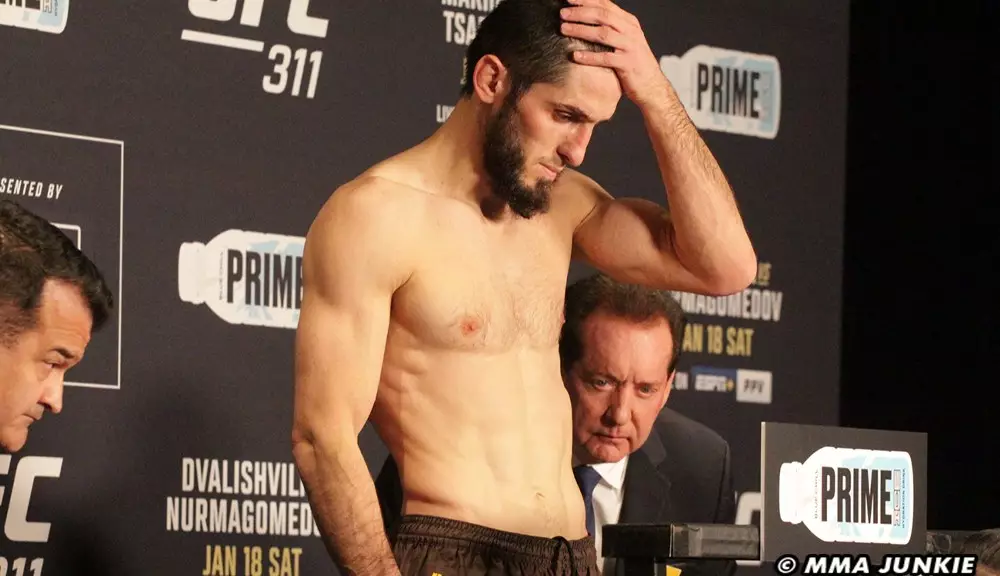The world of mixed martial arts (MMA) often presents a complex narrative woven between competition, personal ambition, and strategic decision-making. At the heart of this narrative is Islam Makhachev, the reigning UFC lightweight champion, whose recent statements about potentially pursuing a title in a higher weight class have raised eyebrows. Chael Sonnen’s critiques shine a light on Makhachev’s motivations and the implications behind his rhetoric, suggesting a deeper narrative at play—one revolving around weight management, personal desire, and the physical demands of combat sports.
When Makhachev defeated Renato Moicano at UFC 311, he articulated his intention to challenge Dricus Du Plessis for the middleweight title. Transitioning from the lightweight division, which has a weight limit of 155 pounds, to middleweight at 185 pounds is no small feat. This leap of 30 pounds is not merely about adding mass; it involves significant physiological changes, including muscle building and adapting to different fighting styles, which could alter Makhachev’s competitive edge. Sonnen posits that this move isn’t merely for accolades but might reflect a discomfort with remaining in a lighter weight class—essentially, an appeal for escape, rather than a clear challenge to another fighter.
Makhachev’s recent performance saw him weigh in at 155 pounds, only to bulk up to 178 pounds on fight night. Such drastic fluctuations highlight the strenuous demands placed on fighters to maintain their weight while also preparing for high-stakes bouts. For Makhachev, maintaining a weight suitable for competition might now feel more burdensome, as Sonnen suggests. The grind of cutting weight can often weigh heavily on an athlete’s psyche. For many fighters, this pressure can lead to burnout or early retirement, which adds another layer to Makhachev’s statements about moving up.
Sonnen likens Makhachev’s situation to that of his mentor, Khabib Nurmagomedov. Khabib retired not solely because he was done with competition but intersecting with the complexities of contractual negotiations and weight disputes that may have disheartened him in the end. This draws a parallel for Makhachev, as Sonnen warns of a similar predicament: if he feels entangled by the unending cycle of weight management, it may catalyze his early exit from competitive fighting.
Sonnen also reflects on the concept of ‘team’ in combat sports, specifically the camaraderie and loyalty within Makhachev’s circle, underscoring the unique bond shared among fighters from Dagestan. This loyalty ties back into Makhachev’s reluctance to challenge fellow teammates or close associates such as current welterweight champion Belal Muhammad. Here, the honor among fighters seems to operate as both a personal and professional restraint, possibly complicating Makhachev’s path to pursuing titles in weight classes that are otherwise accessible to him.
In combat sports, personal relationships can profoundly affect career trajectories. The “code of honor” in Makhachev’s camp may serve to limit his ambitions, creating a complex interplay between personal loyalty and professional achievement that could stifle him if he is not careful. This sense of respect and brotherhood, while admirable, might hinder his pursuit of a legacy that could otherwise include multiple championship titles.
For Islam Makhachev, the reasons behind suggesting a jump in weight classes signal a multifaceted struggle—an inner conflict that balances aspiration with the reality of the demands placed upon him as a fighter. The notion of moving to middleweight might be seen as a quest for freedom from the rigorous weight cuts and the associated stress of competing in his current division.
Chael Sonnen’s assessment provides a thought-provoking lens through which to understand Makhachev’s considerations. In a sport where physical endurance, mental resilience, and the weight of one’s aspirations intertwine, Makhachev’s future remains contingent not only on his performance but also on his ability to navigate the personal and professional challenges that lie ahead. As he weighs his options, the next chapters in his career promise to be as compelling as his fights inside the octagon.

